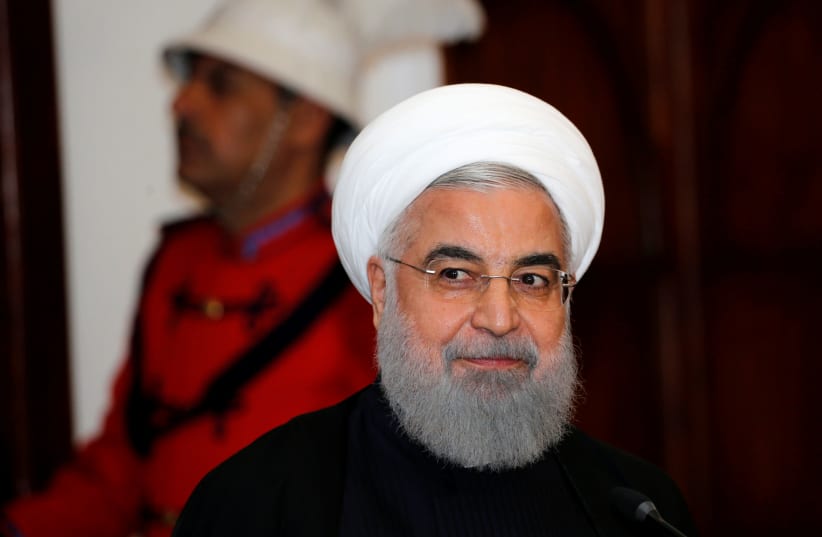DUBAI/GENEVA, Nov 5 (Reuters) - Iran will start injecting uranium gas into centrifuges at its underground Fordow enrichment facility, Iranian President Hassan Rouhani said on Tuesday, a highly symbolic breach that will complicate European efforts to salvage Tehran's nuclear deal.
Under the 2015 agreement between Iran and world powers, Iran agreed to turn Fordow into a "nuclear, physics and technology center" where 1,044 centrifuges are used for purposes other than enrichment, such as producing stable isotopes, which have a variety of civil uses.
Tehran had agreed to curb its nuclear program in exchange for the removal of most international sanctions. It has gradually reduced its commitments to the accord since the administration of U.S. President Donald Trump withdrew from the agreement in May 2018 and reimposed sanctions.
The pact allows Iran only to spin the centrifuges at Fordow, located inside a mountain near the holy city of Qom, without injecting gas. Uranium gas injection could allow production of enriched uranium, banned at the site under the pact.
"Starting from Wednesday, gas will be injected into centrifuges at Fordow as part of our fourth step to reduce our nuclear commitments to the deal," Rouhani said in a televised speech.
Kazem Gharibabadi, Iran's ambassador to the International Atomic Energy Agency (IAEA), said Iran had told the agency that it would start injecting UF6 (uranium hexafluoride) into centrifuges at Fordow on Wednesday.
The deal bans nuclear material from Fordow and by injecting UF6 into centrifuges, the facility will become an active nuclear site rather than a research plant.
"The IAEA was requested to send its inspectors to monitor the process," Gharibabadi said, quoted by state television. The IAEA monitors Tehran's compliance with the deal.
The United States called Iran's move a "big step in the wrong direction" and said that Tehran had no credible reason to expand its uranium enrichment program.
"We fully support the IAEA in conducting its independent verification role in Iran and look to the IAEA to report on any developments," State Department spokeswoman Morgan Ortagus said, adding that Washington would continue its policy of economic pressure on Tehran until it changed its behavior.
Trump says the 2015 deal under predecessor Barack Obama did not go far enough in curbing Iran's nuclear and missile programs or its support for proxy forces in the Middle East region.
ENRICHMENT WORK
Bob Einhorn, a nuclear expert and former State Department official now at the Brookings Institution, said the move is not a big increase in Iran's activities.
"There are kinds of things they might have done to be more provocative, including (to) increase enrichment levels say to 20 percent or to stop cooperating with the IAEA," he said. "They didn’t do that."
Iran's nuclear chief Ali Akbar Salehi said Iran will enrich uranium to 5% at Fordow on Wednesday. Tehran could also enrich uranium to the 20% level if needed, he said, "but right now there is no need for that."
The deal capped the level of purity to which Iran can enrich uranium at 3.67 percent - suitable for civilian power generation and far below the 90% threshold of nuclear weapons grade. Iran denies ever having aimed to develop a nuclear bomb.
U.N. nuclear inspectors reported in July that Iran had cranked up enrichment to 4.5% purity as its first step to decrease its nuclear commitments.
These measures will further complicate the chances of saving the accord, which European powers, Russia and the European Union have called on Iran to respect.
The U.N. Secretary-General Antonio Guterres called on all parties to abide fully by their commitments under the pact.
Iran said on Monday it had accelerated enrichment by doubling the number of advanced IR-6 centrifuges in operation, adding that it was working on "a prototype called the IR-9, which works 50-times faster than the IR-1 centrifuges."
Rouhani gave another two-month deadline to Britain, France and Germany to salvage the deal by protecting Iran's economy from crippling U.S. sanctions.
"We can't unilaterally accept that we completely fulfill our commitments and they don't follow up on their commitments," Rouhani said. Tehran says talks are possible if Washington lifts sanctions and returns to the deal.
"All these measures are reversible if other parties fulfill their commitments ... We should be able to sell our oil and to transfer its money into the country," Rouhani said, referring to U.S. sanctions on Iran's oil and banking sectors.
